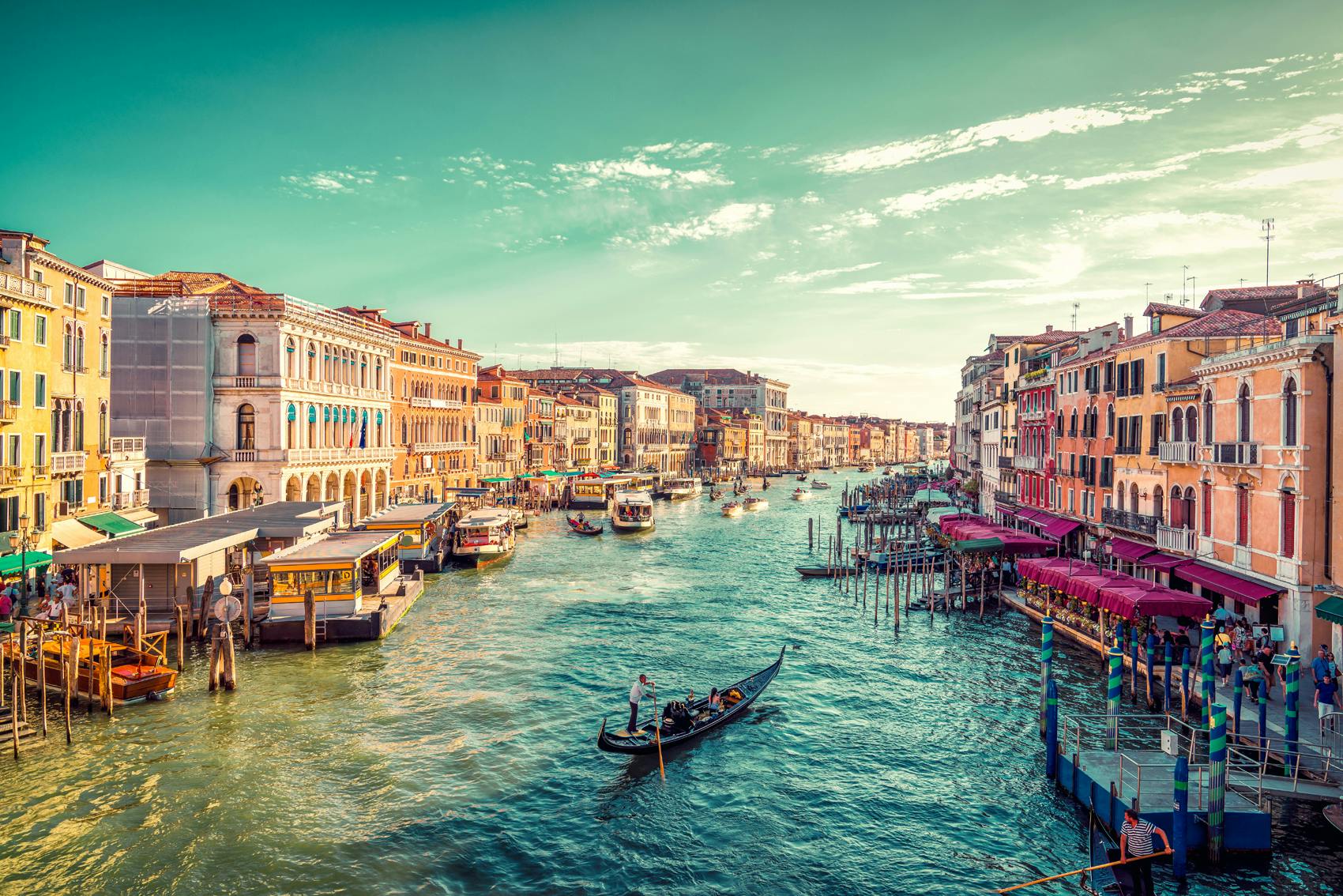Work in Italy
While proving a highly popular destination with tourists, to secure a graduate job in Italy you'll require the skills and experience employers are looking for as well as a firm grasp of the language
Famously shaped like a boot on the world map, Italy is a country that regularly features on the top destination lists of leading travel websites. This is unsurprising, as it's a nation that has everything - the perfect blend of the ancient world meeting modern society.
Steeped in historical significance and at the forefront of fashion and culture, by living and working here you'll get to enjoy its sunny climate, breathtaking landscapes, inspiring architecture and fine food.
When you're not working, you can visit art cities such as Florence, with its Michelangelo and Giambologna sculptures, or admire the Gothic palazzi and canals of Venice. You could also tick sightseeing in Rome off your bucket list and relax in one of its delightful cafés. On other days, you could hit the fashion boutiques of Milan or head to Naples, the birthplace of modern pizza.
Despite the draws of a Mediterranean lifestyle, you'll find that work for native English speakers is hard to come by due to the high competition for jobs. However, foreign workers who can speak Italian and have the right combination of skills, qualifications and experience may still be able to find employment - especially in major cities such as Florence, Milan, Genoa and the capital Rome.
Jobs in Italy
It may be the world's ninth biggest economy, according to Investopedia (July 2024), but Italy relies heavily on its manufacturing and services industries. The unemployment rate is at 6.5% (July 2024), which is its lowest level since 2008.
The contrast between the north and the south is stark - northern Italy is more industrialised and developed and known for its abundance of private companies, while the south relies heavily on agriculture and farming.
You'll find that as the majority of the country's 59 million inhabitants reside in the north, ambitious graduates are more likely to find work in large northern towns and cities such as Milan, Turin and Genoa.
Plus, with millions of travellers flocking to Italy every year to see its famous sights, casual work and temporary contracts in the tourism industry are much easier to find than permanent employment in other sectors.
Popular graduate jobs
- Automotive
- Chemical products
- Engineering
- Insurance
- Telecommunications
Most Italian locals aren't fluent in English, and therefore it's unlikely you'll secure work without mastering the language.
The services sector dominates the economy with a strong focus on wholesale, retail sales and transportation. Driven by the manufacturing of luxury items such as fashion, cars and furniture, industry also accounts for a fair amount of Italy's output. In terms of agriculture, Italy is one of the world's largest producers of wine, olive oil and fruit.
The number of multinational companies in Italy is smaller than in other European countries, but strong Italian brands include automobiles, such as Ferrari and Lamborghini, and fashion designers Gucci, Prada, Versace and Armani.
Work positions are mostly advertised online and through recruitment agencies.
You can search for job vacancies in Italy at:
- Glassdoor - English speaking jobs in Italy
- Jooble - English speaking jobs in Italy
- The Local Italy
- Reed - Jobs in Italy
- Total Jobs - Jobs in Italy
- TrovoLavoro.it
Skills shortages
The European Centre for the Development of Vocational Training (CEDEFOP), an agency of the European Union (EU), has identified the following as shortage occupations in Italy:
- health
- information and communications technology (ICT)
- marketing, design and creative
- science, technology, engineering and maths (STEM)
- teaching.
Within each field, the organisation also narrowed down the most in-demand jobs. For ICT, this includes:
- actuaries
- electrotechnology engineers
- mathematicians
- software and applications developers and analysts
- statisticians.
The CEDEFOP also looked at employment growth in Italy across the job sectors and found that an insufficient supply of graduates was one of the main causes for these skills shortages, especially in areas such as science and engineering.

How to get a job in Italy
Networking through friends and family is still considered a viable means of hearing about any available work in Italy.
Therefore, finding a job when you're already in Italy will be easier, as you can begin making contacts directly - wherever you decide to start looking.
If you're currently employed with a company that has a presence in Italy, you could enquire about possible secondment opportunities.
If this isn't feasible, try making speculative applications, which are welcomed in Italy as many jobs aren't advertised. If you go down this route, be sure to do your research and send your application to the most appropriate person at the organisation.
For advertised positions, applications are usually completed online and consist of a CV and cover letter, or an application form. All applications should be submitted in Italian unless otherwise stated. To save time, get your academic transcripts and certificates translated too.
You should expect a lengthy application process, which will generally involve a series of interviews as well as psychometric testing.
Summer jobs
As tourism is such big business in Italy, casual or temporary work should be easy enough to find.
There are plenty of seasonal jobs on offer including bar, hotel and restaurant work. You could find employment in summer camps or holiday resorts and if you possess some skills on the slopes, you could work at a ski resort in the Italian Alps.
The agricultural sector also offers casual summer jobs such as fruit picking and other outdoor activities.
If you have some childcare experience, you might consider finding work as an au pair.
As long as you have the funds to work for free, volunteering is a great way to expand your skillset and learn a new language. Voluntary work looks great on your CV and gives you the chance to network and build contacts.
For the latest volunteering opportunities in the country, visit:
- Go Overseas - Volunteer programmes in Italy
- International Volunteer HQ - Volunteer in Italy
- Volunteer World - Italy
- Workaway.info - Volunteer and work in Italy
- Worldpackers - Italy
Teaching jobs
English teachers are in high demand in Italy, so competition for posts is fierce, with many teachers expected to have a Teaching English as a Foreign Language (TEFL) certificate with at least 100 hours of teaching experience.
The majority of teaching jobs are available in large towns and cities such as Rome, Florence and Milan, although opportunities exist throughout the country. You could teach in state schools, private language schools, universities or within businesses teaching their staff English.
You can enrol online to study for a relevant TEFL qualification, while some teaching jobs may require a Bachelors degree.
Recruitment for teachers typically begins in early spring for positions available in September/October.
For more country-specific details, see The TEFL Org - TEFL jobs in Italy, while a list of language schools in Italy is available at ESL Base - English language schools in Italy.
There are also opportunities to teach English in Italy through the British Council's Teach English as a Language Assistant scheme.
Internships
As Italians place such value on networking, a work placement is a great way to build your contacts in the country. An internship is also useful for sharpening your language skills.
Internships in Italy usually last between three and six months with the country especially popular with those looking to get work experience in fashion, architecture and art.
Internships and summer work placements are available at:
- AIESEC UK - a youth organisation that offers career-focused internships for students and recent graduates.
- GoAbroad.com - Internships abroad in Italy - an online search engine for global internships with options for specific countries, including Italy.
- Go Overseas - Internships in Italy - another database of internship listings, you can search the programmes available in Italy and apply direct to the relevant provider.
- Piktalent Italy - a student recruitment organisation that works with hundreds of companies across Europe, with opportunities to intern in major Italian cities such as Milan and Rome.
Italian visas
If you're an EU citizen, or come from Norway, Iceland or Liechtenstein, you won't require a permit to work in Italy. However, to remain in the country for longer than 90 days, you'll need to apply to your local town hall (comune) for residency. They will be able to advise you on the documentation to be submitted along with your application.
Non-EU citizens, including those from the UK, will require a visa, residence and work permit to live and work in the country. There are different types of visa available depending on the purpose of your stay.
When applying, you'll need to submit a completed visa application form, a valid passport, recent passport photographs and supporting documents, which will depend on the type of visa you're applying for. You should also check the required format of these documents, like whether they need to be:
- translated
- originals or copies
- signed electronically or with ink
- dated within a certain time before submission.
If you're a foreign national, you'll need to apply for a residence permit as soon as you arrive.
To find out more about Italian work visas, contact the Italian embassy or consulate in your home country - in the UK this is the Embassy of Italy in London. Alternatively, you can visit the Italian Ministry of Foreign Affairs and International Cooperation.
For the latest foreign travel advice for Italy, see GOV.UK.

Language requirements
In most cases, the ability to speak Italian to a high level is essential for securing a job.
Proficiency in Italian will make living in the country a lot easier too, as many parts of the population don't speak English. English is more likely to be spoken in tourist areas and large towns and cities, but less so in rural areas.
Studying an Italian language course will help you learn the language or further improve your skills to the required standard.
How to explain your qualifications to employers
UK qualifications are directly comparable to those in Italy thanks to the Bologna Process, so they should be easily recognised by employers. You can find out more about comparing your international qualifications, by visiting ENIC-NARIC - Italy.
What it's like to work in Italy
If you're employed in Italy with a social security number then you're entitled to all the benefits, including free public healthcare, annual leave and pensions. If you're self-employed, not all of these benefits may apply.
Family time is an important aspect of Italian culture and as such workers try to strike a healthy work/life balance.
Italians work 36 to 40 hours per week, with the maximum legal working week set at 40 hours, plus eight hours of overtime. As work tends to be highly structured, you'll typically work Monday to Friday, 9am to 1pm, take a one-and-a-half to two-hour lunch break, and then work up to 6pm or 7pm.
All employees are entitled to at least four weeks of paid annual leave, although 22 to 26 days' holiday is common. The country recognises 12 national public holidays, while there are other regional holidays that may be observed.
There are three income tax bands starting from 23% on income up to €28,000 (£23,610), followed by 35% on income to €50,000 (£42,160), and 43% on anything above this amount.
Find out more
- Discover what it's like to study in Italy.

